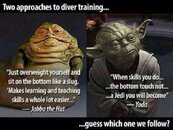Considering what you described, I wouldn't have you wear 27lbs! But don't feel too bad... I was assisting an OW class and one of the students literally needed 40lbs on his weight belt!!! (I kid you not...) Just goes to show the importance of a good buoyancy check. It is also a good habit to write down your exposure suit and amount of weight you use for a dive in your log book. Im not just saying that, I practice what I preach! That has definitely helped me out when I dive in a suit I haven't dove in for a while.
I agree with chrpai, more instructors should have their students hover while doing skills.

I agree with chrpai, more instructors should have their students hover while doing skills.





